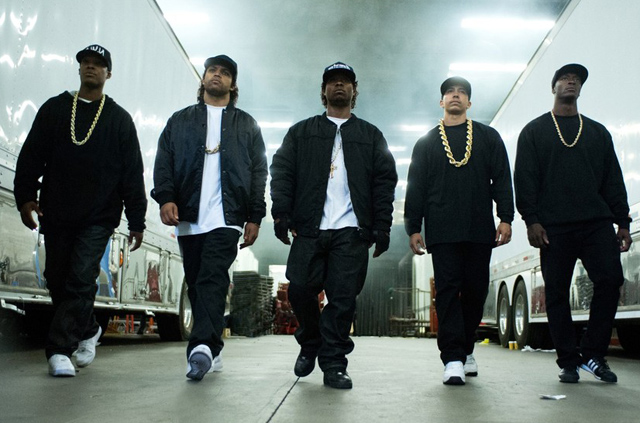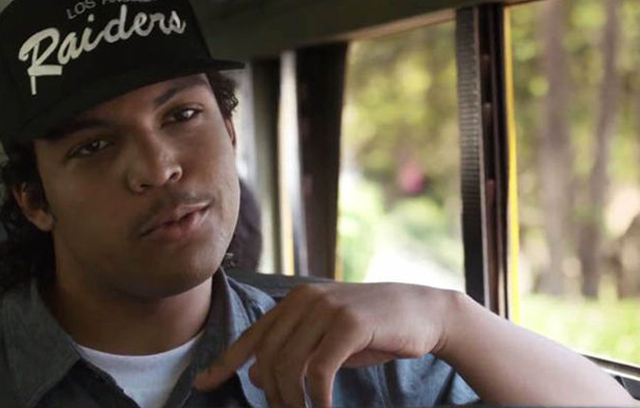CHICAGO – There is no better time to take in a stage play that is based in U.S. history, depicting the battle between fact and religion. The old theater chestnut – first mounted in 1955 – is “Inherit the Wind,” now at the Goodman Theatre, completing it’s short run through October 20th. For tickets and more information, click INHERIT.
N.W.A. Influences an Era in ‘Straight Outta Compton’
 Rating: 3.5/5.0 |
CHICAGO – Gangsta rap, like all the revolutionary and society bending genres before it, was formulated from dire frustration and a need to shake up the surroundings that encased their creators. The prime movers of gangsta was the group N.W.A., and their story is told in “Straight Outta Compton.”
The Compton in the title is in southern Los Angeles county, a city known for its African American and Hispanic gangs, with lower and middle-working class neighborhoods. This is where gangsta rap was born, from the artistic well of five young men who would challenge the authority of everything around them. “Straight Outta Compton” is a biography film about N.W.A., but it also serves an allegory for institutional racism against the group, and the way they fought against it through their rap art. The film is stark and effective, especially within the sometimes brutal machinery of the music industry in the late 1980s/early ‘90s, when the times they were a-changin’, but agents cheating artists out of money never seemed to change. Although the film runs a little too long, it’s an education in the roots of a rap music form that really stuck it to The Man.
Compton, California, in 1988 is the setting for the film, where a vinyl DJ nicknamed Dr. Dre (Corey Hawkins) is tired of his small gigs, especially when his turntable scratching talents are producing some new beats. He works in the club scene with Dj Yella (Neil Brown Jr.) and MC Ren (Aldis Hodge), and Dre seeks help from a neighborhood entrepreneur named Eazy-E (Jason Mitchell) to start a record label.

The Cast as the Rap Group N.W.A. in ‘Straight Outta Compton’
Photo credit: Universal Pictures
Recruiting a local rap poet nicknamed Ice Cube (O’Shea Jackson Jr.), the group evolves into N.W.A.(an acronym for N*ggaz Wit Attitudes), who takes street rap and pulls it into a harsher light of political and social anarchy. Eazy-E recruits a music mogul named Jarry Heller (Paul Giamatti) to get the group more play, and their debut album, “Straight Outta Compton” is a sensation, but the dynamic and attitudes within the context of their journey predicts future problems.
As a music group biography, the patterns are very familiar – working class kids with a dream of music stardom, invents something revolutionary in their music form and genre, suffer the pitfalls of the the music “business,” and finally experiences the downfall that comes from jealousies and hurt feelings within it all. What is different was the callousness the members of N.W.A. had to live with, as black men in an authoritative America (through police officers) who constantly wanted to marginalize them. This is evident throughout the film, and is a very effective way of strengthening the message – especially in light of the last year, regarding the clash of law enforcement and the African American male.
The performances are indelible, and each member of the main cast provides a glimpse into the soul of the group. The genius choice of O’Shea Jackson Jr. as his father’s younger self, paid off with an electric and nuanced performance – the younger Jackson was able to communicate what made Ice Cube tick. Corey Hawkins as Dr. Dre and Jason Mitchell as Eazy-E were also standouts, creating subtle and emotional portrayals that never got stereotypical. Even a quick-off of Keith Stanfield as a young Snoop Dogg kept it real, rather than cartoony.
The director was F. Gary Gray, who actually directed the real Ice Cube in the classic cult film “Friday” in 1995. His attention to detail was an insider’s view, and the decision – with screenwriters Jonathan Herman and Andrea Berloff – to parallel N.W.A.’s rise with the Los Angeles of the Rodney King riots was an essential touch. The young Ice Cube drives through the chaos of the riots, and his rap poems had both predicted and reflected the circumstance.

Ice Cube (O’Shea Jackson Jr.) in ‘Straight Outta Compton’
Photo credit: Universal Pictures
The film is a bit longer than it needed to be, with the last half hour an afterthought rather than a payoff. They shoehorned Eazy-E’s death from AIDS-related illness in that time frame, and while it was a part of their history, it didn’t fit in what contextually had come before. This is a minor complaint, because most of the film is compelling, especially in the sense of music history. N.W.A., in its form and legacy, were as important to rap as The Beatles were to rock and roll, in the way both flexed and bent their particular music styles. If you are a music fan of any type, the film will fascinate you.
The timing of the film is monumental, in the truth that we also need reminders about why African American men are treated as outsiders in their own society. In the constant stereotyping, imaging and accusation, the primal scream of gangsta rap has as much calmed souls as inflamed them. The anger has to go somewhere.
 | By PATRICK McDONALD |


